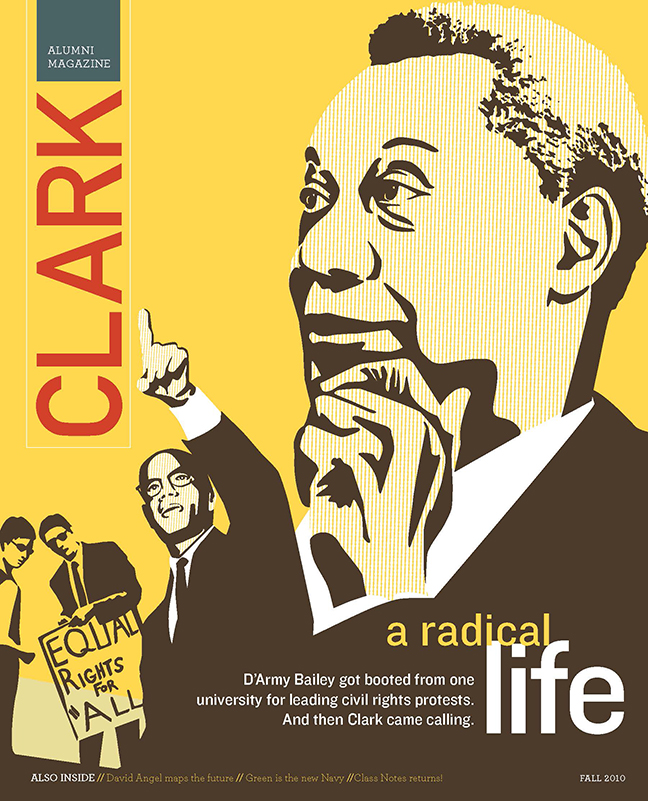Clark Magazine
In 1973, Clark was one of the first schools to host a competitive Ultimate Frisbee meet
It was the year of the Watergate hearings, the King- Riggs Battle of the Sexes, and streaking. The World Trade Center was officially finished. U.S. troops were leaving Vietnam. And a Clark sporting legacy was woven into the crazy-quilt that was 1973.

OK, perhaps it’s more a point of pride than an institutional legacy. In any case, Clark University is among a small group of recognized founders of the original collegiate competitive Ultimate Frisbee league, vanguard of a sport that captured the subversive hearts and shaggy-topped minds of ‘70s-era alt-jocks. In fact, Clark comes tantalizingly close to claiming a long-contested bragging right of being the first school ever to host an intercollegiate Ultimate meet.
A wonderful online conversation exists, with recollections of pioneering games and mild arguments about which campus teams can claim the deepest Ultimate roots. It seems Rutgers and Princeton were the first colleges to officially compete, on Nov. 6, 1972. Clark recorded hosting its first-ever match on April 21, 1973, which Tufts won 31-21.
Today, the team sport of Ultimate (the trademark-protected “Frisbee” was dropped) reports more than 12,000 college players on more than 700 teams. And millions worldwide play the game, according to organizers. However, the “official” rules and unique spirit of Ultimate remain much the same as when the sport was invented at a New Jersey high school in 1968. Those high school graduates became the Ultimate diaspora, spreading the sport to colleges in the Northeast and beyond.
Walter Belding and Steven Frieman, both Class of ’76, began recruiting players for Clark in March 1973. The Cougars played 13 games during the ’73-74 academic year, winning nine, according to Belding, who then also wrote about the team’s matchups in the student newspaper, The Scarlet. “It was in the fall of 1973 that Ultimate really got going in New England,” he recalls. “There was an anti-jock attitude to the sport. It appealed to people who liked sports but didn’t necessarily like the ferocity of the competition. It was the kind of thing you could show up for and play.”
The lack of ferocity didn’t mean Ultimate was for the laid-back, meek, or geeks.

Massood Abolfazli ’76 and others loaned the Cougars some strong soccer playing skills. “We did take it seriously, as did the folks at Holy Cross and the people at Tufts, Rutgers, and Hampshire. We practiced and we were actually pretty good. There was no precedent for it. That’s what, from a personal perspective, really interested me,” says Abolfazli, a Clark Athletics Hall of Famer (’96) who was named an All-America soccer player in his senior year. “We played our early games on the University Green. The fun of that was that we attracted an audience looking at something they hadn’t been before — every throw and every catch was something really new.”
Ultimate also offered a new and somewhat rare co-ed team experience at the time. The Title IX guarantee of equal opportunity in school sports had been enacted in June of 1972. In one Clark Scarlet account, a reporter wrote: “GIRLS play Frisbee, too. Their presence on the team is greatly appreciated, as it exemplifies the main idea of Frisbee’s play; that is, sportsmanship and enjoyment mixed with competition. More important than winning the games against Tufts and Rutgers will be assuring that participants come away from the game healthy and in good spirits.”
Other Scarlet sports section write-ups about the original “Big Red Frisbee Machine” name an extensive roster of players. Appearing in print are: Belding, Abolfazli, Frieman, Dave Magid, Lee Goodman, Esther Berkowitz, Emelyn Carpluk, Wendy Rufleth, Steven Kurtz, Andy Dennison, Ian MacGregor, Mike Warshaw, Rick Johnson, Dave Abelow, Phil Oppenheim, Paul Nordstrom, Tom Addison, Paul Pintrich, Lenny Horowitz, Harriet Baskas, Ethel Baker, Rick Schnell, Neal Weinstein, and Roy Baldo.
Nowadays, the mostly club-level sport of Ultimate still figures into college-choice checklists. Many a campus tour guide still hears, “Does your school have an Ultimate team?” The highly organized and elite collegiate championships are covered by the CBS College Sports Network. But, despite its evolution and slick online presence, the culture of Ultimate still reflects and embraces an ethos of free-spirited, egalitarian sportsmanship.
USA Ultimate defines the sport as a “player-defined and controlled non-contact team sport played with a flying disc on a playing surface with end zones in which all actions are governed by the ‘Spirit of the Game.’” A dearly held tradition is that “of sportsmanship that places the responsibility for fair play on the players rather than referees.” Referees? We don’t need no stinkin’ referees!
Ultimate is still active as a club sport at Clark, but like Ultimate teams on many campuses, it remains loosely stitched into the fringes of mainstream athletics and campus fandom.


